One Dead as Explosion in Damascus Targets Iranian Interests
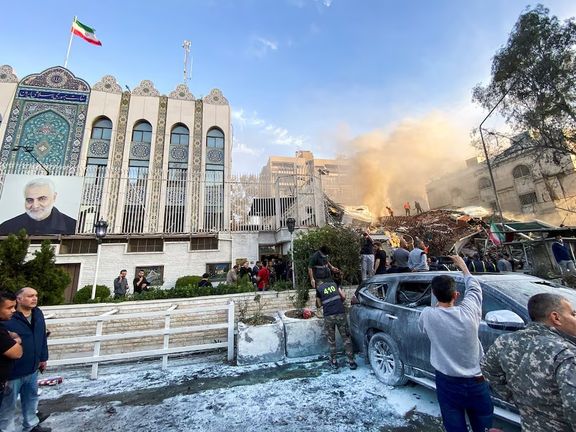
An explosion in the al-Maza neighborhood of Damascus, which houses the Iranian embassy, has reportedly resulted in at least one death.

An explosion in the al-Maza neighborhood of Damascus, which houses the Iranian embassy, has reportedly resulted in at least one death.
The Jerusalem Post citing Syrian sources said the incident occurred early Saturday morning and has escalated tensions in an area already fraught with conflict.
The identity of the dead, a man "close to Iran," has not been disclosed. The explosion follows a series of targeted attacks in the same district, including an air strike last month attributed to Israeli forces.
That attack killed several senior members of Iran's Revolutionary Guards, including senior commander Mohammad Reza Zahedi, intensifying the ongoing shadow war between Israel and Iran in the region.
In retaliation, Iran executed a direct assault on Israel on April 13, launching hundred of drones and missiles, marking an escalation in their confrontations.
However, Israel in turn retaliated with a precision strike on a military base in Isfahan, central Iran.
Reports indicate that shortly before Zahedi’s assassination, the Iranian diplomatic residences were about to be relocated to a new apartment complex on the same street. The move was cancelled at the last minute during a meeting of the senior echelons of the Revolutionary Guards, who chose to remain in the consul building.
Iran's participation in the Syrian civil war, backing President Bashar al-Assad since its onset over a decade ago, has sparked disputes with Israel. Perceiving Iranian forces in Syria as an imminent threat, Israel has regularly targeted their bases and arms depots starting in 2017.
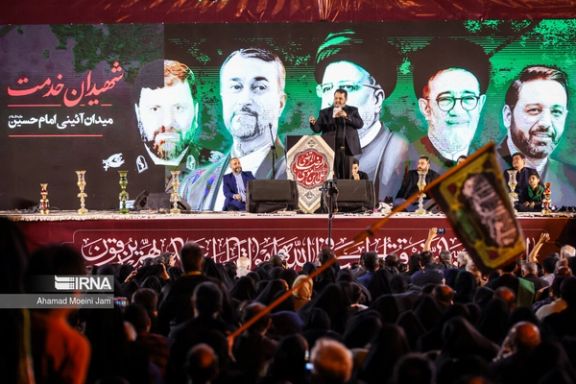
Government ceremonies in Iran have been Islamized since 1979, reflecting the transformation of the state into an Islamist entity. In this process, religious icons and ceremonies replaced national symbols and rituals.
Central to these rituals is the act of mourning, as Shia Islam is a religion deeply rooted in themes of victimhood and martyrdom, with followers shedding tears for saints who, according to Shia beliefs, were all martyrs.
For this reason, during Shia mourning seasons such as Ashura and Arbaeen, the anniversaries of Shia saints' deaths, the anniversary of the Islamic Republic's founder's death, and the sudden deaths of current leading figures, the mourning industry, with the full support of governmental, state, and public institutions (including municipalities), becomes highly active. The objectives are to restore the Islamic Republic's declining legitimacy and popularity and to strengthen its social base.
This multi-billion-dollar industry is a crucial part of the regime's propaganda machine. Gone are the spontaneous and purely religious ceremonies of the pre-1979 era. Today, every national mourning ceremony is a state-sponsored program, meticulously planned and executed, from budgeting and organization to procurement and mass mobilization. The attendees of these ceremonies are not merely independent believers and mourners; officials often inflate the numbers of these engineered crowds, presenting tens or hundreds of thousands as millions to secure more funding. The core attendees are primarily public sector employees and those who benefit from the system, with a smaller portion consisting of the poor and unemployed, attracted by the promise of free meals, drinks, or pilgrimage opportunities.
The budget
There are special budget lines for government propaganda, including mourning ceremonies, in the government’s annual budgets for all ministries and organizations under the title of a 2% cultural contribution (out of the $110b annual budget for 2024). There is a direct budget of $600 million, plus the contributions from each ministry and government entity. This propaganda budget is devoted to promoting the Islamic Republic’s ideological tenets, not climate change, equal rights or similar ideals.
Apart from this, hundreds of cultural institutions which pretend to be charities, research institutes, or think tanks are involved in these propaganda activities. The government budget for religious institutions for 2024 was about 360 trillion rials ($600m), which is used to maintain the infrastructure and functions of this industry - such as hiring and taking care of personnel and facilities. We do not know exactly how much money government-owned companies and banks with a share of about 60% of the yearly budget spend in this area; they are all non-transparent. The municipalities take care of the budget for local religious groups, which are the main handlers of the ceremonies.
Khamenei’s office, which oversees several enterprises worth tens of billions of dollars, allocates some budget for religious institutions, but the specifics of these allocations have never been disclosed.
Hotel fees for travelers to attend official funerals or Arbaeen ceremonies in Iraq, thousands of buses that provide transportation services to the attendees, food, insurance, and other services presented by tents and prayer stations are all paid by government and public funds.
Organization
Three large organizations with tens of thousands of employees and budgets of tens of millions of dollars organize mourning and other religious-state ceremonies: the Islamic Propaganda Organization, the IRGC’s Basij Organization, and offices of Friday prayer imams and representatives of the Supreme Leader throughout the country. The satellite institutions that run these programs include headquarters for performing prayers, cultural centers of mosques, units for commanding good and forbidding vice, zakat offices, and numerous Sharia enforcement headquarters. Additionally, the ideological units of the Basij, IRGC, and the national army are involved. These organizations are coordinated by the Coordination Council for Islamic Propaganda.
All high-ranking officials are supposed to participate in these programs. The recruitment pool of participants is mainly neighborhood Basij bases, religious delegations, and eulogy and Qur'an groups.
Logistics
With the expansion of the mourning industry, many procurement activities have been entrusted to private sector institutions established by regime affiliates, taking over from governmental and public sectors. These institutions provide a wide range of necessary supplies, from large kitchens and rest areas for children to establishments producing tracts, banners, and advertising pamphlets. They are always ready to mobilize, much like the service sector in Hollywood, providing everything from flags, fake monuments, keffiyehs, and headbands to cardboard tombs, pickup trucks, and sound systems.
Institutions of eulogy
There is a state-sponsored institution in Iran, which is in charge of education and welfare services and social benefits for Islamist eulogists, religious DJs, and masters of ceremonies. Its mission is to propagate the culture of mourning and Shia eulogy. This institution covers tens of thousands of eulogists invited to government and public centers on dozens of occasions. Professional religious singers even provide eulogy services on special jets carrying the bodies of state leaders to their burial sites, such as Raisi's coffin being transported to Mashhad this week. In videos of Raisi’s funeral ceremonies, from Tabriz and Qom to Tehran, Birjand, and Mashhad, the voices of numerous eulogists can be heard resonating over the crowds and participants.
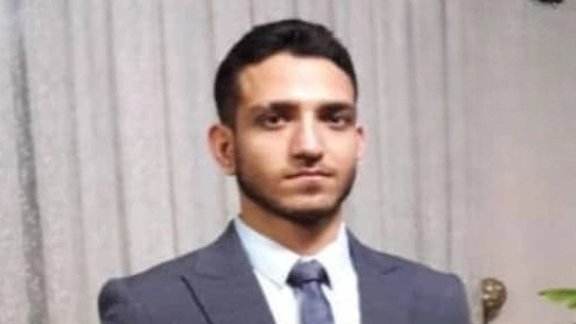
The Iran Human Rights Organization (IHRNGO) reported that the Supreme Court of Iran has rejected a retrial request for Arvin Ghahremani, an Iranian Jewish citizen.
Ghahremani, at the age of 18, was sentenced to death for his alleged role in a fatal street brawl.
According to the IHRNGO, the decision places Ghahremani at immediate risk of execution, underscoring a judicial process marred by oversight and lack of fair representation.
Relatives of Ghahremani have voiced concerns that critical elements of his defense were ignored during the trial. These include his efforts to aid the injured party by attempting to transport him to a hospital and his subsequentefforts to save the man's life—details absent from the court documents. The family insists that he was attacked and only acted in self-defense, disarming the man who had assaulted him with a knife.
The Norway-based rights group is calling for a halt to Ghahremani’s impending execution and a transparent, thorough review of his case and others similarly jeopardized. The IHRNGO’s plea highlights a trend in Iran’s judicial proceedings, where the right to a fair trial is often supplanted by swift punishment.
On a broader scale, the IHRNGO's latest findings reveal that within the last month alone, at least 103 people were executed in Iranian prisons, marking an acceleration in the use of capital punishment. Mahmoud Amiry-Moghaddam, director of IHRNGO, criticized the global community for its silence on such executions, saying, "The international community's silence... is unacceptable and must end."
Amnesty International has also weighed in, reporting 853 executions in Iran in 2023, the highest in eight years.
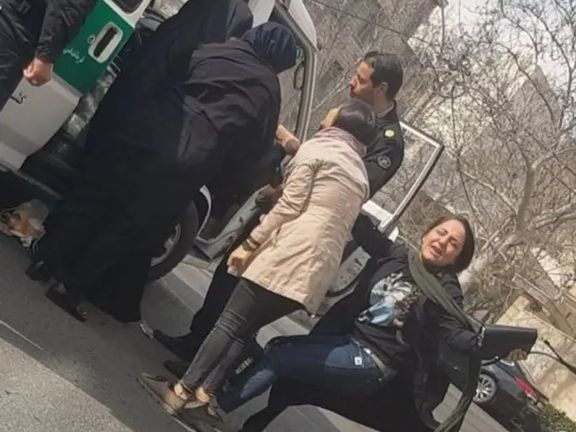
Hossein Hosseini, the Chief Justice of Iran’s Kordestan Province, has announced the establishment of a specialized branch at the Sanandaj Revolutionary Court specifically designed to handle cases of hijab removal.
Hosseini revealed that "a significant portion of those who commit hijab removal are under the ages of 15 and 18," highlighting the state's focus on penalizing young women.
The initiative is part of the broader Project Noor, which has ramped up enforcement of the Islamic Republic’s hijab laws, leading to increased violent confrontations on the streets as authorities clamp down on Iranian women. The forceful approach has sparked renewed global outrage.
Hosseini categorized individuals who remove their hijab into three groups: the first receives only a verbal warning for unintentional non-compliance; the second, includes those seen as encouraging others to unveil and are actively pursued by the authorities; the third group involves individuals accused of systematically challenging hijab, targeted by security and intelligence forces for organized defiance.
The newly launched court branch shows Iran's decision to criminalize what it perceives as “acts of rebellion” against its “moral codes,” particularly focusing on the youth. This strategy reflects the government’s desperation to assert control amid growing internal and international criticism.
Further unsettling reports have surfaced since the implementation of Project Noor, detailing police misconduct, including extortion, theft, andsexual harassment by officers tasked with enforcing hijab compliance. Such accusations exacerbate the already volatile relationship between the public and the police, eroding trust and stoking fears among the population.
Global human rights organizations, student bodies, and activists are vocally condemning such measures, highlighting the infringement on basic human rights and personal freedoms in Iran.
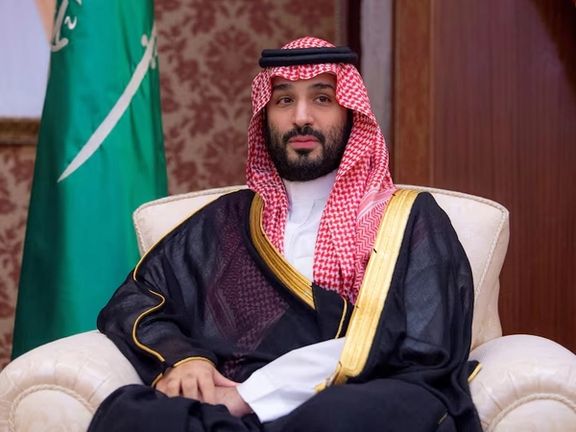
Iran's state media has once again reported that Saudi Crown Prince Mohammed Bin Salman has agreed to an invitation to visit Iran, although no date for the visit has yet been announced.
This marks the first potential visit by a Saudi royal to Tehran in over two decades, signaling another step towards diplomatic engagement after years of strained ties. However, last year Iran had also claimed that the Saudi price would visit.
According to IRNA, the state-run news agency in Iran, the visit was agreed upon after Mohammed bin Salman responded positively to an invitation from Mohammad Mokhber, Iran's acting President.
The announcement comes over a year after a détente that saw the two nations agree to reopen embassies and resume diplomatic exchanges following a seven-year freeze. Despite such moves, the relationship between Riyadh and Tehran remains fraught with suspicion and minimal substantive engagement.
Observers note that the détente has yet to bring about significant agreements or ease the primary points of contention that have long fueled hostilities between the two regional powers, especially the Houthi militias in Yemen.
The rivalry extends to disputes over key energy resources, with both nations staking claims on the vital Arash/Dorra oil and gas fields, which have yet to see a resolution acceptable to either party.
The diplomatic outreach occurs amidst heightened regional tensions, particularly due to Iran's support for various proxy groups that many see as destabilizing efforts in the Middle East. Despite discussions on potential economic cooperation and investment, deep-seated disagreements over fundamental regional issues continue to overshadow the slow-paced rapprochement.
Saudi Arabia cut diplomatic relations with Iran in 2016 after its embassy in Tehran was stormed during a dispute concerning Riyadh's execution of a Shiite Muslim cleric. Further tensions arose from ongoing conflicts, including missile and drone strikes by Iran's Houthi militia on Saudi oil facilities and tankers in the Persian Gulf, exacerbating the strain during a conflict that has spanned nearly a decade.
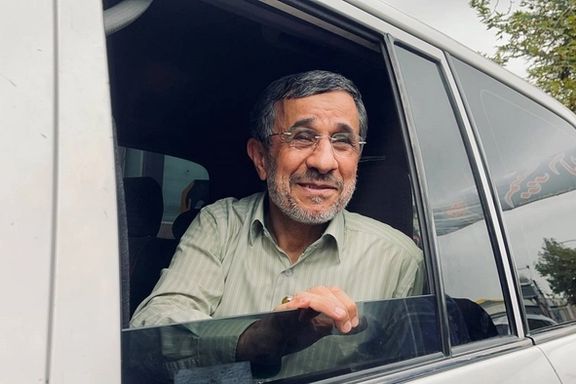
Former President Mahmoud Ahmadinejad announced that he is considering entering the upcoming presidential elections following the recent death of Iranian President Ebrahim Raisi.
Dolat Bahar Telegram channel, run by Ahmadinejad supporters, posted a video of him on Saturday addressing his fans and saying that he’s confident “the situation is changing for the better.”
“There are rapid changes taking place, not just in Iran but in the world, and I am hopeful that we will soon see the sweet changes,” Ahmadinejad said.
A new president will be elected on June 28th following the death of Ebrahim Raisi and his delegation in a helicopter crash last weekend.
Ahmadinejad supporters in the parliament have already welcomed his possible candidacy, claiming he’s “one of the most popular political figures in the country.”
Speaking to ILNA, Ahmad Alireza Beigi, a representative of Tabriz in the parliament, said, "If Mahmoud Ahmadinejad runs for president, he will win."
He also warned about the consequences of Ahmadinejad's disqualification without going into further detail. He was barred from running in the 2017 and 2021 presidential elections by the Guardian Council largely controlled by Supreme Leader Ali Khamenei.
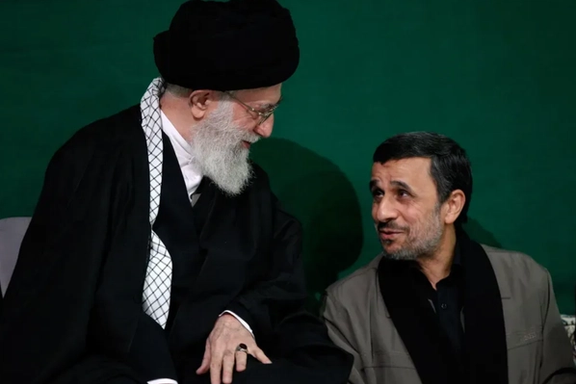
"Ahmadinejad must be assured that the Guardian Council will approve him for candidacy because if he signs up and is disqualified, it will have dire consequences," Alireza Beigi added.
After the former president was denied the chance to run in the 2017 elections, he became an outspoken critic of the system, even openly criticizing Mr. Khamenei. He has been walking a tightrope in the past two years and remaining mostly silent to avoid a backlash by loyalists close to the Supreme Leader.
Candidates seeking to run for the presidency, parliament, and the Assembly of Experts, which appoints Ali Khamenei's successor, must be approved by the Guardian Council, the constitutional election watchdog.
After Raisi's death, the Islamic Republic leader faces the challenge of re-engaging an electorate deeply disillusioned by recent elections. At the same time, efforts are being made to ensure that hardliners maintain control over the now largely ceremonial presidency, as state institutions undergo a purge to be filled entirely with Khamenei’s loyalists.
According to official statistics, 40.6 percent of eligible voters participated in the first round of the recent parliamentary elections. In Tehran, 24 percent of the population voted, the lowest in any election in the Islamic Republic's history.
Even lower turnout was recorded in the run-off elections earlier this month. In Tehran, where only seven percent of eligible voters cast their ballots.
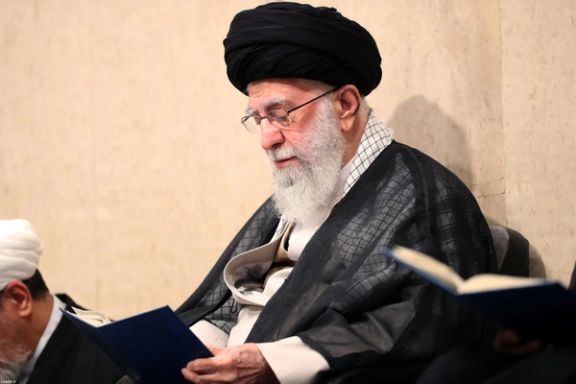
On Saturday, Elias Hazrati, the managing editor of Tehran’s leading reformist daily Etemad, pointed out that holding elections with low participation “is a disaster for any country and a more severe one for the Islamic Republic” since the vote of the people is used to validate the legitimacy of the system.
In regards to the elections, Iran analyst and journalist Morad Vaisi believes the Islamic Republic is about to enter its third phase.
“The first phase was about the left versus the religious right; the second phase was reformists against fundamentalists. The third phase involves military and security personnel,” Vaisi told Iran International.
“In the upcoming elections, we will not see any other faction members running; it will probably be someone among the military and security figures,” he added.
While many consider the Iranian presidency to be more of a symbolic post, with significant decisions made in Khamenei's headquarters, the eyes are on him to see what lies ahead in the country's political landscape.
Some also took the fact that the last three presidents—Hassan Rouhani, Mahmoud Ahmadinejad, and Mohammad Khatami—were not present at Raisi’s funeral on May 22, to be a symbolic gesture signaling the presidency's ever-eroding position since it was taken that they were not invited to the ceremony.
Additionally, Khamenei's apparent car-free attitude toward Raisi's death after the news broke about his helicopter crash and disregard for his role in the country were other indications of the disregard of the administration.